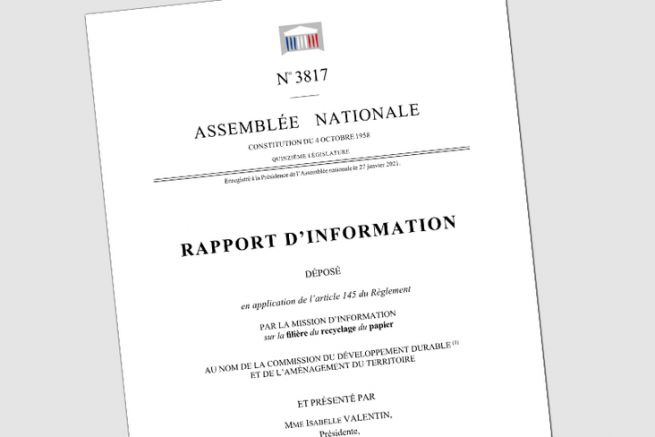End of January, the parliamentary fact-finding mission on the paper recycling industry submitted its report to the National Assembly, on which it has been working since September. This fact-finding mission was initiated after the closure in 2020 of the UPM Chapelle - Darblay recycled newsprint mill. The 11-member team was tasked with analysing the situation of paper and cardboard recycling in France and proposing measures to improve the industry.
The professional union of the cardboard, paper and cellulosic industries (Copacel), which was questioned by the mission, states in a press release that it regrets a missing element in this 120-page report.
The file contains "interesting proposals" . However, the union regrets "an error in analysis" on the place of recycled fibres and the absence of a key element, namely the improvement of the competitiveness of paper companies.
Copacel supports the objective of increasing the recycling of waste products made of cellulosic fibres in France. It also validates recommendation no. 1 to study the environmental impact of electronic media in relation to that of printed matter. It also approves measure No. 9, which would remind companies in all sectors of their obligations regarding the sorting of paper waste.
The strong incentive to recycle paper is counterproductive for the industry
But "the report, however, makes a mistake in its analysis" . Five out of 20 proposals aim to encourage the use of recycled products. However, this would not solve the problem of excess waste paper collection compared to the existing recycling capacity in the country.
And Copacel illustrates his point: "For example, a policy of public procurement of recycled office paper will not solve the situation of over-collection by local authorities, for the simple reason that waste paper from municipal collection is not used to produce recycled office paper."
The consequence of a strong demand for recycled paper will therefore lead to the import of recycled paper, "at the expense of a wood-based paper produced in France with a high circular economy performance' . It is necessary to find a balance between fibres that come directly from wood and fibres that are recycled. Moreover, the report also states that, from an environmental point of view, and particularly with regard to climate change, recycled paper is not preferable to paper made from virgin fibres.
Competitiveness of the paper industry, the central issue
But the "major deficiency" of the report is the issue of the competitiveness of the paper industry, an issue which "is only grazed." when this is a "core element".
"The situation in our country is linked to structural problems (decline in the use of graphic paper, closure of Chinese borders to European waste) which lead to investment or restructuring choices in Europe, choices made at the expense of our country, which is less competitive than those in which the paper industry is maintaining or developing" explains the professional organization.
And Philippe d'Adhémar, president of Copacel, adds: "It is by improving the competitiveness of companies and developing the production capacities of the paper industry that our country will be able to increase the value of paper and cardboard collected and sorted".














